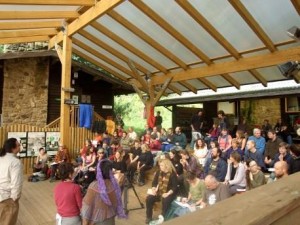The Permaculture Association (Britain) is a national education & research charity. It enables professionals in specific sectors, civil society and private citizens to gain access to education & information about the theory and practice of permaculture design. It supports freelance teachers by issuing guidance & advice, producing teaching materials, and offering a small bursary for those on low incomes to access teacher training. It also certifies courses is an accreditation body in its own right.
- Educational System in UK
- Permaculture organisations, courses and teachers in the UK:
- Questionnaire Educational Structures 2012
- Update – How have the Permaculture Educational Structures changed in the UK in the years 2012 – 2014?
- Diploma Pathway
- Strengths, Weaknesses and Opportunities (PDF)
The Association also supports research into various techniques & approaches used in permaculture, including forest gardening and mixed vegetable polyculture trials. It facilitates networking between academics, professionals and individuals who are using the permaculture approach by holding events, publishing periodicals, and running a website. The Association also supports and promotes a network of land-based projects that demonstrate permaculture design in action, and runs a scheme to enable groups to visit them and learn about permaculture. Update – How have the Permaculture Educational Structures changed in the UK in the years 2012 – 2014? Interview with Joe Atkinson, British Permaculture Association, 21st July 2014 by Gaye Amus I don't think interest in permaculture in Britain has increased as a result of the EPT project though we have learned from seeing new ideas, projects and techniques in other countries. The intercultural aspect was fascinating. Through our visit in Bulgaria we came to realize the people in Britain are so removed from the food production. The tradition of small-scale local food production being still a key part of the culture in Bulgaria was really interesting. Through the EPT, several British teachers have become more active in foreign countries, many of them leading teacher trainings as well. We often hear from other European countries that the British system is the most advanced, developed or mature and so in response to that, we want to share our experience. However, we are conscious that we don't want to be teaching British permaculture around Europe, we want to make sure that the principles of permaculture are used and local permaculture systems are supported to demonstrate their own evolution. The British Permaculture Association has learned some interesting ideas about diploma systems particularly from the German and French models. The German system is more financially sustainable than ours and the French model has this wonderful "companionage" system so the idea is that a student can go and work with various different tutors and gain experience. It is based on the medieval apprenticeship model. We have been considering how to use a similar system to build up smaller accredited courses so a student who would like to learn a practical permaculture course could travel to a land centre and get a hands on experience ,which counts towards a larger qualification. During the project we also came to learn some really nice songs and games from different countries. Answering the question to has there been any changes in our association in a national level, paradoxically, we've gained diploma students who are based in Europe. It helps to contribute to the capacity of the association in a small way but we are a little concerned that thıs may undermine other emerging national diploma systems. There's an increasing demand for some of our expertise around educational systems management so people have asked for British educational consultancy to advice them on issues, such as how to set up formal accreditation systems.
- Log in to post comments

